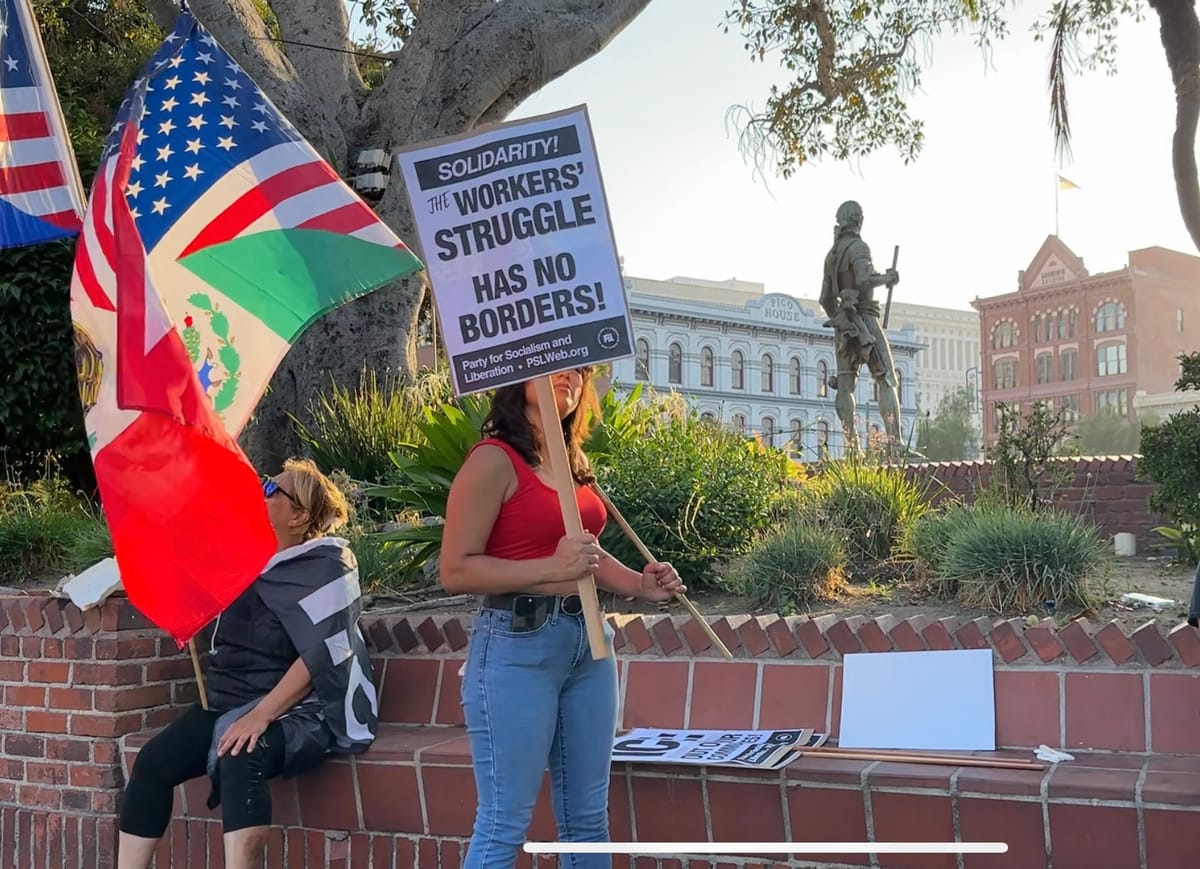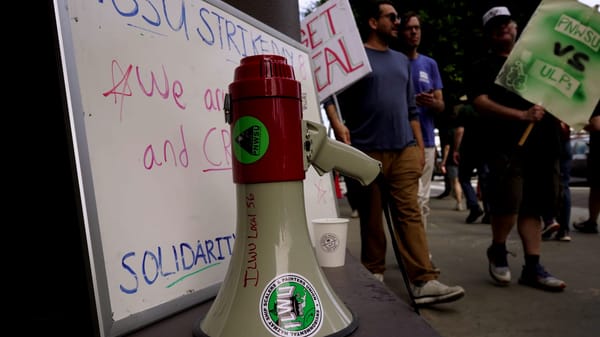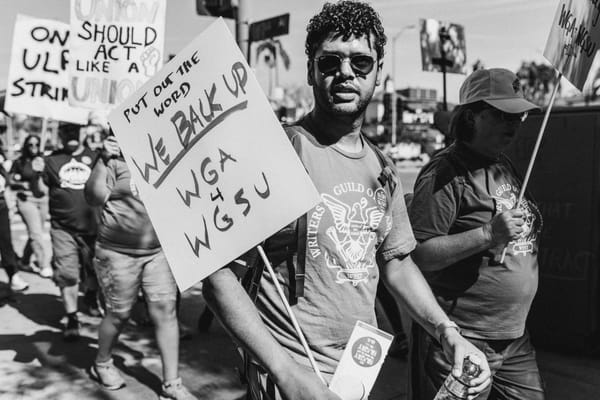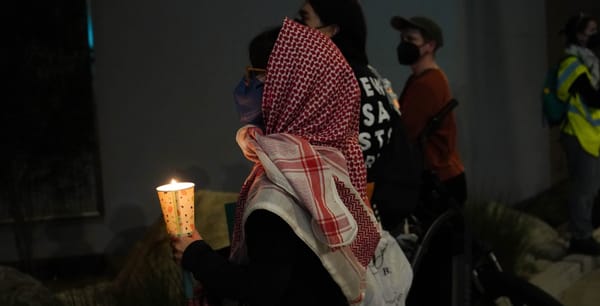Last Week in Labor: August 17-29, 2025
Hundreds strike at GE Aerospace, SpaceX wins against the NLRB, major protests planned for Labor Day, and more headlines you missed.

Happy Friday, folks. Thanks for your patience as I navigated some personal matters last week. We've got a decent bucket of news for you this week as we head into Labor Day weekend. Be sure to stick around to the end of the newsletter to see what's coming from me this next week. Alrighty, onwards...
Notable News in Labor
Over 600 UAW workers at two GE Aerospace facilities go on strike
Workers at the Evendale, Ohio and Erlanger, Kentucky plants walked off the job on strike on Thursday. From Reuters,
The strike marks the latest flashpoint in a wave of labor unrest sweeping through aerospace and aviation industries, where unions have been flexing their muscles to secure new contracts amid high demand for skilled workers.
From airline pilots and flight attendants to machinists and aerospace engineers, workers across the sector have pressed for higher pay and stronger job protections in the last couple of years.
The union's local chapter represents over 600 workers across the two sites. Union members had voted by a majority in favor of a strike if a new agreement was not reached by the end of day on August 27.
California labor report shows steady union density rates despite nationwide decline
A new report from the UC Berkeley Labor Center, the UCLA Institute for Research on Labor and Employment, and the Inland Empire Labor and Community Center at UC Riverside found that union density rates in California remain steady despite nationwide declines. From the Daily Californian,
Using publicly available data from 2024, this collaborative report compiles statistics on California’s union membership, held elections and strike activity. According to the statistics, California’s union density — in this instance, the union coverage density — has remained relatively steady with averages ranging from 16% to 18% for the past two decades.
Court Rules With SpaceX in Case Seeking to Gut NLRB, in Blow to Workers’ Rights
Last week, I shared online about the SpaceX/NLRB decision and what implications it could have for workers. Sharon Zhang over at TruthOut has a good analysis of what happened and what this means for us.
In its ruling, U.S. Court of Appeals for the Fifth Circuit said that safeguards for NLRB board members and administrative law judges for the NLRB are unconstitutional. The NLRB board makes key determinations on federal labor law, and administrative law judges adjudicate cases regarding unfair labor practices.
The ruling suspends unfair labor practice proceedings against Elon Musk’s SpaceX and co-plaintiffs Energy Transfer and Findhelp. Donald Trump appointee Judge Don Willett wrote in his decision for the court that it constitutes irreparable harm for the companies to be subject to such cases “[w]hen an agency’s structure violates the separation of powers.”
United Airlines Flight Attendants Reject New Tentative Contract, Union Now Survey Why
After 71% of flight attendants at United Airlines rejected a recent contract offer, the AFA-CWA is now surveying members ahead of another December bargaining session. From Natalia Shelley at Aviation A2Z,
Despite union leaders presenting the deal as “industry-leading” and more favorable than recent agreements at American Airlines (AA) and Delta Air Lines (DL), the majority of members refused to ratify it.
The AFA-CWA is now distributing surveys to tens of thousands of flight attendants, aiming to identify their most pressing concerns. One theory is that many crew members voted “No” because of an ingrained belief that workers should always reject the first tentative agreement, expecting improved terms in a second round of negotiations.
This pattern has played out across the industry. Flight attendants at American Airlines, Alaska Airlines (AS), and Southwest Airlines (WN) have all rejected initial offers before ultimately ratifying revised contracts.
AEW's 2300 Arena Debut Met With Union Protests Over Underpaid Labor
IATSE workers are protesting the AEW pro-wrestling residency in Philly over underpayment of its workers. From WhatCulture,
The Philadelphia chapter of The International Alliance of Theatrical Stage Employees (IATSE) plans to protest the residency, because they argue that AEW events in Philadelphia "are failing to meet area standards by paying substandard wages and benefits". In the same post on social media, IATSE continued: "When employers undercut these standards it threatens wages, benefits, and job opportunities for all entertainment workers in the community".
On their Facebook page, the group elaborated to state that they're chiefly concerned about stagehands. They said: "Neither the 2300 Arena nor AEW have provided documentation showing that stagehands are being paid the area standard set by IATSE Local 8, or that workers are not being misclassified as independent contractors".
Video game union wants to stop layoffs, 100-hour work weeks
Video game workers are organizing against staggering working conditions in the industry. From Danielle Chiriguayo at KCRW this week,
“The media industry is very well represented. As far as unions and the games industry, it's time for us to join film, TV, animation, all these other creative industries with union representation,” she tells KCRW. “The amount of layoffs in the games industry has been really historic in the last three years, especially. Having a career in the games industry just isn't sustainable, and we want to change that.”
In the face of consistent layoffs, Bongfiglio says the guild is focusing on securing workers’ rights, including those for contractors and freelancers — who she says are the foundation of the industry. UVW is also targeting protections around severance pay, a two-week notice before layoffs, recall rights, and comprehensive compensation packages.
ICE carries out a second raid on a New York farm as workers push to unionize
The war on immigrant workers continues. From People's Dispatch,
Agents with the US Immigration and Customs Enforcement (ICE) carried out another raid at Lynn-Ette & Sons Farms in western New York on August 14, detaining seven farmworkers on their way to work. The raid came just months after another ICE raid, where 14 workers were detained.
The United Farm Workers labor union has condemned the raid at the farm that the UFW has been actively organizing in since 2022. Of the 14 workers detained at the May 2 raid, ten were ultimately deported. UFW Secretary Treasurer Armando Elenes labels the raids as “shameful employer complicity in the Trump administration’s efforts to eliminate legal protections and lower wages for farm workers.”
In time for Labor Day, letter carriers get some back pay
Some good news just in time for Labor Day, from my striking union siblings over at their strike paper, the Pittsburgh Union Progress:
On Friday, most of America’s letter carriers at the United States Postal Service will get a raise — nearly $5,000 at the top level — thanks to National Association of Letter Carriers’ negotiations that got the people who deliver our mail full back pay resulting from wage increases awarded over the past two years.
Every day, 200,000 city letter carriers deliver 376 million pieces of mail to nearly 169 million delivery points, supporting a $1.92 trillion mailing industry. This universal service is vital, particularly in rural areas where the Postal Service ensures the delivery of medications, packages and other essential items.
Unions Respond to Trump Administration
The USDA reorganization is an attack on federal workers. Fight back.
The administration’s “reorganization” plan for the USDA will upend the important services that the Department of Agriculture provides to American communities, and disrupt the lives of many dedicated public service workers who provide those services.
The plan will effectively cut important jobs, disrupt the delivery of important services, and force workers to choose between uprooting their lives to move across the country or lose their jobs.
Massive Union Protest in Washington DC against Trump Policies ahead of Labor Day
Commentary & Analysis
The Labor Movement Is in a Fight for Its Existence Against a Neofascist Threat
Bill Fletcher, Jr. is back in In These Times with another incisive analysis about what labor must do in order to survive this era of competitive authoritarianism: lean into antifascist organizing and rhetoric. Read the whole analysis, it's fantastic. Here's a taste:
To the extent organized labor failed to pay attention to shifts in the methods of work and in the workforce itself — and particularly the growth of casualization and the informal economy — it appeared to its critics to be a movement for an “elite,” though it is highly unlikely that most trade union members would think of themselves as such.
Despite electoral-political engagement by trade unions, there has been a stark reluctance by most union leaders and leadership bodies in the United States to explicitly name the fascist threat, or the broader threat posed by right-wing authoritarianism. This aversion must be situated in the context of the chronic illness that has befallen the U.S. trade union movement — and, for that matter, many other trade union movements in the advanced capitalist world.
This illness amounts to a decline in the face of the neoliberal offensive and a failure to accept that the terms of the post-World War II labor/capital truce no longer hold. In fact, unions in both the public and private sectors are currently being obliterated by more politically-reactionary segments of capital. Rather than pushing the limits on democratic capitalism, the trade union movements have up to this point largely accommodated themselves to defeat, albeit a slow-moving defeat.
Three Crises of Labor
Hamilton Nolan has a good analysis of where we're at and what the stakes are for us. As he says, ""Organize or Die" gets uncomfortably relevant."
America did not get to the bad place it is in today by accident. We are here as a result of the combination of a political system that serves money, and a half-century long explosion of economic inequality that has produced an oligarchy. Donald Trump is the product of these factors, but he is not the underlying problem. The underlying problem is that too much power has flown into the hands of too few people, and they have used that power to arrange the entire economic and political system in their favor. Democracy, such as it was, is an inevitable casualty of this process.
Climbing out of the hole that we are in will require more than one or two favorable election cycles. It will require shifting that underlying balance of power away from the oligarchs and their allies, and back towards the rest of us. Power that has accumulated among the rich and ultra-rich will have to be wrested back into the hands of the working class majority. This pro-democratic shift in economic and political power can only be accomplished if the organized power of the working class gets stronger—strong enough to compete with the power of the rich. In other words, organized labor must get stronger if we are to turn around America’s descent into fascism. This is why you should care about what is happening with America’s labor unions even if you have been operating under the illusion that unions don’t mean much to you personally.
How the Labor Movement is Building Bridges with the Faith Community
NewsGuild Sees Organizing Surge as Media Workers Fuel Grassroots Militancy
Some encouraging analysis of the groundswell of new organizing within my own union, The Newsguild. From Randy Furst over at LaborNotes,
Into this changing news landscape has come an influx of new journalists who bridle at the poor working conditions and low pay inflicted by media moguls building their empires on the cheap. Thousands of these media workers are finding a home in the NewsGuild.
The Guild has transformed itself in recent years, thanks to rising rank-and-file militancy and innovative organizing tactics. Since 2020, the Guild has organized 210 workplaces, including some of the largest media organizations in the U.S. That includes 600 tech workers at the New York Times (the largest unionized tech unit in the country), 226 workers at Politico, and 180 workers at The Atlantic magazine, as well as smaller operations like 20 workers at the Anchorage Daily News.
Support for Labor Unions Near Historic High as Trump Trashes Working Class
Jon Queally over at Common Dreams has a great analysis of recent polling that shows that Americans really do, in fact, support organized labor, despite the Trump administration's attempts to crush the working class.
Gallup's annual survey, released Thursday, shows more than two-thirds of people in the US (68%) approve of labor unions and the economic security and prosperity they provide working families. The popular support matches record-high numbers of recent years after a long decline from the 1960s through the early 2000s.
The Immigrant Workers Who Power Our Food System Face Growing Threats
Good commentary in Forbes today about the impact of immigration raids on our economy and more importantly, our communities.
Two things are true at the same time. First, our food system would grind to a halt without our immigrant neighbors and friends who work hard to build livelihoods for their families. Immigrants, regardless of documentation status, account for more than three quarters of crop farm workers in the U.S., according to the Pew Research Center via the Minnesota Reformer.
Second—and this should go without saying—when we talk about uplifting the many ways undocumented immigrants contribute to food and farming systems and highlighting how anti-immigrant policies hurt food businesses, we cannot reduce immigrants to being valuable only for their labor. People are people, wherever they were born and wherever they live.
The real conversation we need to be having is bigger than labor and food systems: It’s about our shared humanity.
Looking Ahead...
Coming up from me next week
- Over the last couple of weeks, I've been working on a deeper analysis of the proposed $85 billion Norfolk Southern/Union Pacific megamerger-- talking to railroaders, labor leaders, and diving into the history of railroad mergers and their impact on the supply chain and shipping industry in the US. There's...quite a bit to be worried about, if you're paying attention. That piece drops next Wednesday.
- In that same vein, there have been a number of organizational shake-ups with the Surface Transportation Board, and the independent working groups that help determine rail safety regulations. I spoke with some labor leaders who are worried about what comes next. That analysis also dropping early next week.
- The next installment of my new series, Unemployed in America, will be dropping at the end of next week. In it, we dive into the precarious nature of gig work, what the 2008 economic crisis did working people, and how its impact has stretched deep into the 2020s. Stay tuned for that installment end of next week.
Looking ahead to Labor Day
Labor Day celebrations are upon us, with more than 1,000 actions planned across the United States this weekend and next Monday. The Guardian has a good rundown of what's planned, and why people are hitting the streets.
Will you be among them?
Alright, that's it for me this week. Stay tuned to my socials for some reporting on the 55th anniversary of the Chicano Moratorium here in Los Angeles tomorrow, and the LA/Long Beach Labor Day celebrations next Monday. Plenty of photos and vibes to be shared.
I hope you have a wonderful Labor Day and that you get out into the streets to share that solidarity with your fellow workers.
In love and solidarity,
Mel





